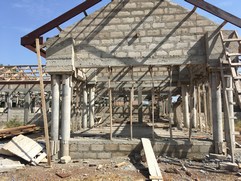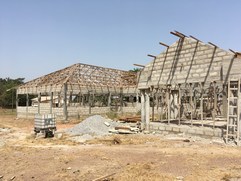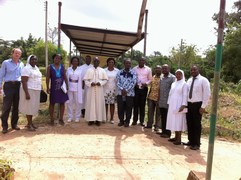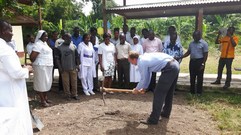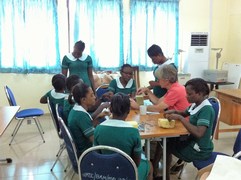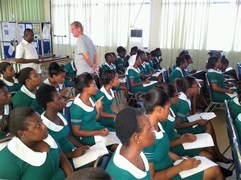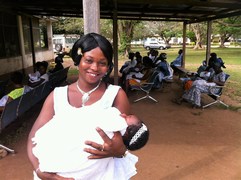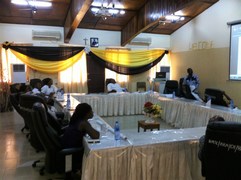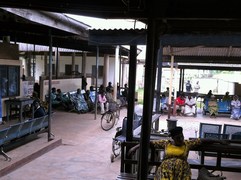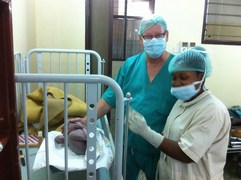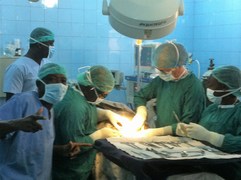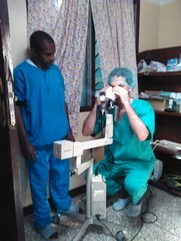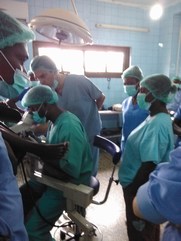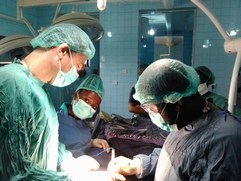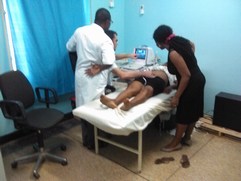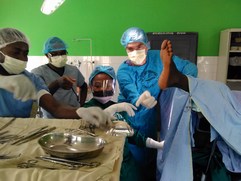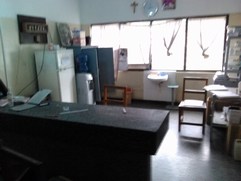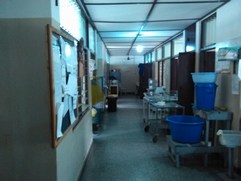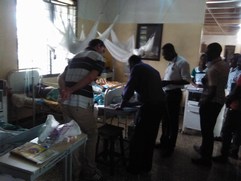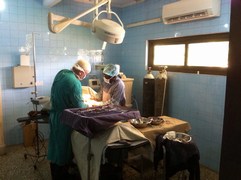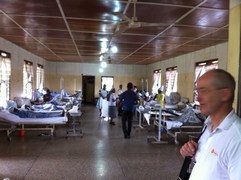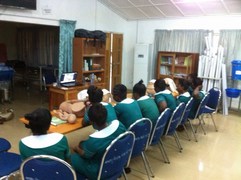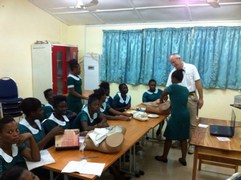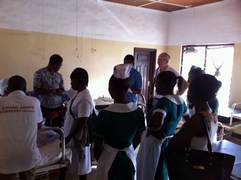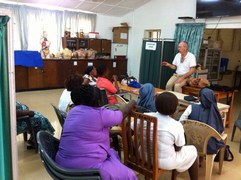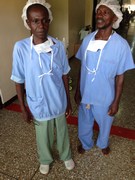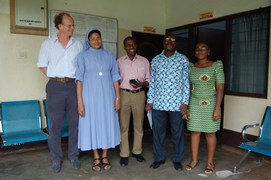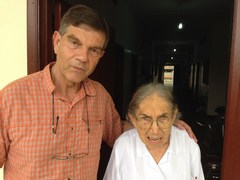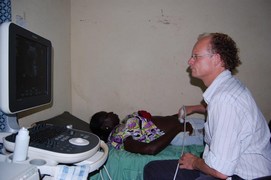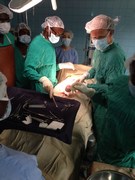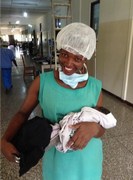Seventeenth working visit October 2023
It is the wettest October in Dutch measurement history, when three experienced gynaecologists Walter Kuchenbecker, Vincent Jongen and Jules Schagen van Leeuwen are lucky enough to be able to exchange our country for Ghana for two weeks. The goal: a visit to the Holy Family Hospital in Berekum to teach there, to operate on complicated cases and to strengthen the long-standing ties with the hospital. And the undersigned (Tycho Oudman) shares this luck because, as a doctor in international health care and tropical medicine (AIGT) in training, he is allowed to join them.
Our journey begins in the capital, where we will participate in a ‘Breast cancer awareness march’, a procession that is organised annually to create more awareness about breast cancer and also to dispel the myths about it. An impressive organisation manages to colour the busy market life in the capital pink for hours with a parade of thousands of singing and dancing people. My trainer had already told me in the Netherlands that the Ghanaian population is remarkably cheerful, colourful and welcoming people and I had to agree with him from the very first moment. Beforehand, we first acclimatise with the organisers of the ‘Breast cancer awareness march’ with a trip to the Volta River. There, on 7 October, we receive the first reports of the Hamas attack on Israel. Walter’s daughter lives in Israel. Fortunately, she is doing well. His son-in-law is a reservist. The impact of the attack is immediately clear to all of us and casts a shadow not only on the day that started out so sunny, but over the entire near future.
We fly inland from the capital Accra to Sunyani, the capital of the province in which the Berekum hospital is located. We are welcomed by a former colleague and above all a good friend of one of the travelling gynaecologists who worked here for many years as a tropical doctor. “Back then, the road to this remote hospital was still surrounded by coffin shops, and there were vultures on the roof of the hospital,” he says. And, although a few of these coffin shops still exist, fortunately there are no vultures to be seen anymore. The hospital bears little resemblance to the stories of the past: there is now a large complex of buildings connected by covered paths, an ICT department, a CT scan and, as the crowning glory of the long-term collaboration with our foundation: a brand new mother-child center. Impressive.
However, the many challenges the hospital faces quickly become apparent, such as shortages of materials and personnel. Relatively simple equipment that is available for every delivery room in most countries, has to be shared with an entire department here. For me, this collaboration is inspiring. The doctors have come up with tricks and detours for most challenges. Scarcity makes creative. Where necessary, my fellow travelers know how to think along, for example by setting up an observation room for high-risk pregnant women using existing equipment. We were able to set up this intensive care unit with the help of largely unused material from the covid-19 unit.
After giving a few educational afternoons and a special overnight stay at a shelter for children with disabilities (https://operationhandinhand.nl/), it is time to return to the rainy Netherlands. As warm as the welcome was, so is the farewell. A full and successful program to look back on. ‘Less full than the previous visit’, is noted. A trend that can only be encouraged in my opinion. A collaboration that is increasingly less based on necessity, and increasingly on mutual learning.
16th working visit to Ghana; January 2023 by Bas Nij Bijvank, Justine Kieftenburg and Harm de Haan
The 16th working visit was mainly focused on strengthening all connections and optimizing the conditions for the co-assistants who will travel to Ghana. For this purpose, in addition to a two-week stay in Berekum, visits were made to Sampa (where new accommodation for the co-assistants has been rented by Dr. Isaac Duodu) and to the St. Theresa's Hospital in Nkoranza, where we spoke extensively with the administrator Fr. John Bremini and the pediatrician/medical director Dr. Rosemund Kokuro, who received us enthusiastically and gave us a tour.
We stayed on the grounds of the Hand-in-hand Coopratie, where approximately 100 severely disabled children are now being cared for by Dr. Ab van Galen and his wife Jeanette. The intention is that the first co-assistants will start here soon, sleeping at the Hand-in-hand and doing their internship at the St. Theresa's Hospital. Meetings were held by telephone with the specialists from Hwidiem who are also happy to help with the education of the Dutch students.
In Berekum, Bas taught a lot about ultrasound to midwives and new, young Ghanaian doctors. Justine, as a future tropical doctor, also taught the midwives and Bas taught pre-eclampsia at the school for Midwifery. During the day, a lot of operations were performed, during which the resident doctors OIGT (Rebecca Groen and Marije van Poelgeest) and the Ghanaian house officers and medical officers were able to do a lot because colleague Edward Mintah had once again put together a good program. The recently started gynaecologist, Dr. Zacharia, is enthusiastic, as we know him from earlier times. The surgeon, Dr. Frank Gyamfi, was also enthusiastic and prepared to take over the coordination of the tropical doctors in training from the recently departed Dr. Paa Hagan, who did this with a lot of knowledge and skill in recent years.
Agreements were made with the contractor Mr Kwasi Kyere Duodu to also complete the final phase of the toilets and shower facilities, in addition to some repairs that need to be done. There were constructive discussions with Sr. Reena about the shortage of senior staff, where she has big plans to increase the number of medical specialists in Berekum in the future and to really make it a training and education centre. That does not alter the fact that in the coming years, with all the young doctors in training, there is a challenge in the supervision of these younger doctors. A visit was made to the bishop in Sunyani where these concerns were also shared.
Later this year the 75th anniversary of the HFH will be celebrated and there are plans to open the new OPD (with the administrative part of the hospital on top of that) then, in addition to perhaps the new Antenatal clinic, which is now under construction next to the maternity block. So, big plans, a lot of progress, challenges galore, also because more and more patients are coming and the inflation and the economic crisis are really noticeable in Ghana, in Berekum and in the hospital itself.
But the warmth, the friendliness and the enthusiasm remain and this remains inspiring.
The photos taken during the working visit can be found here.
Fifteenth working visit to Berekum
From 14 to 22 May 2022, another team consisting of Arnold Kruse and Vincent Jongen (gynaecologists) and Hans Visscher (anaesthesiologist) visited the Holy Family Hospital in Berekum. Already the second working visit after the Covid pandemic, so that we can happily conclude that the previously existing cycle of six-monthly working visits has been restored. Time was spent on collecting all contacts, but of course most of the work and meetings took place during this visit.Operations were carried out on a daily basis together with the Ghanaian doctors. In total, about 15 patients could be helped with a major operation, in which the further development of the technical skills of the local doctors was an important learning goal. After the OR program, obstetrics workshops were organized. Topics covered in the daily sessions included breech delivery, stuck shoulders at birth and vacuum (suction cup) delivery. After a number of presentations, the participants could practice themselves in groups.
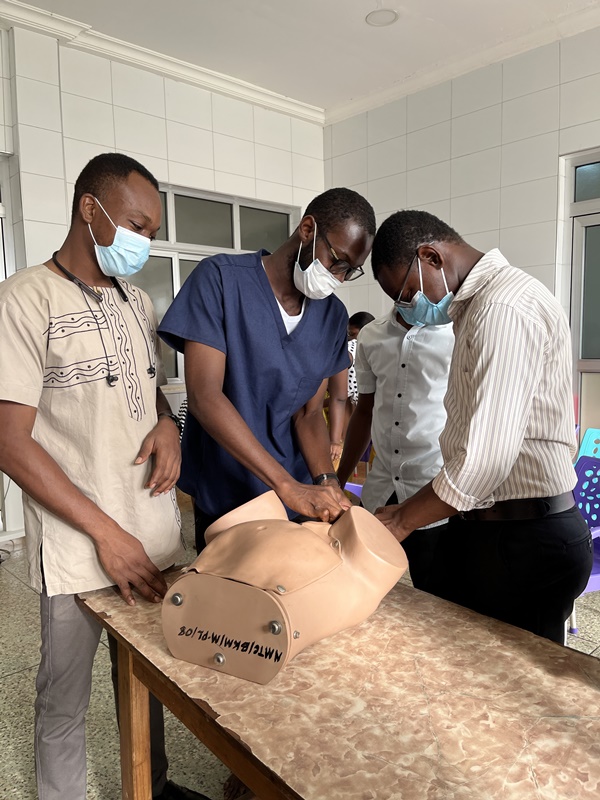 |
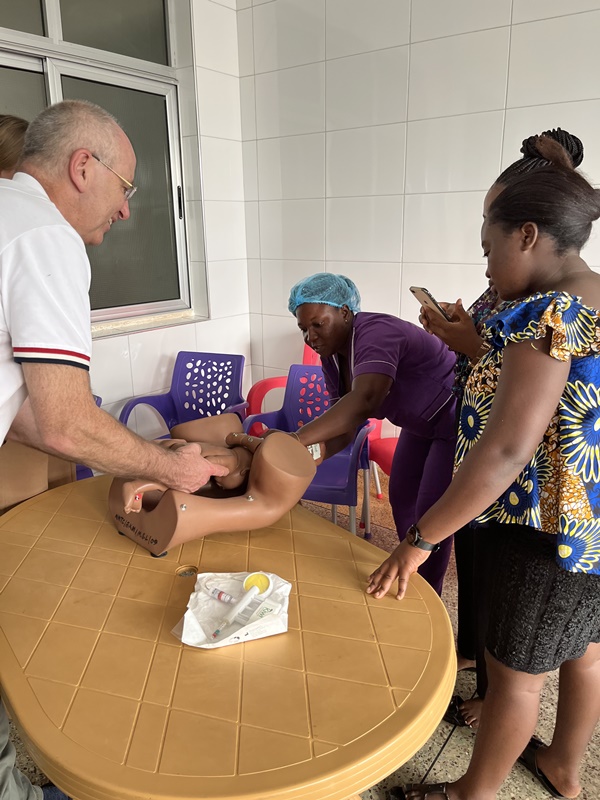 |
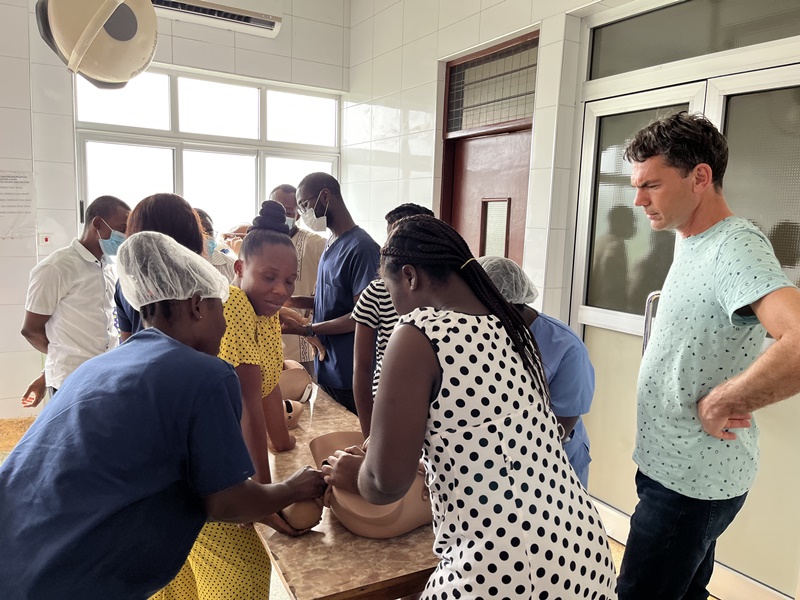 |
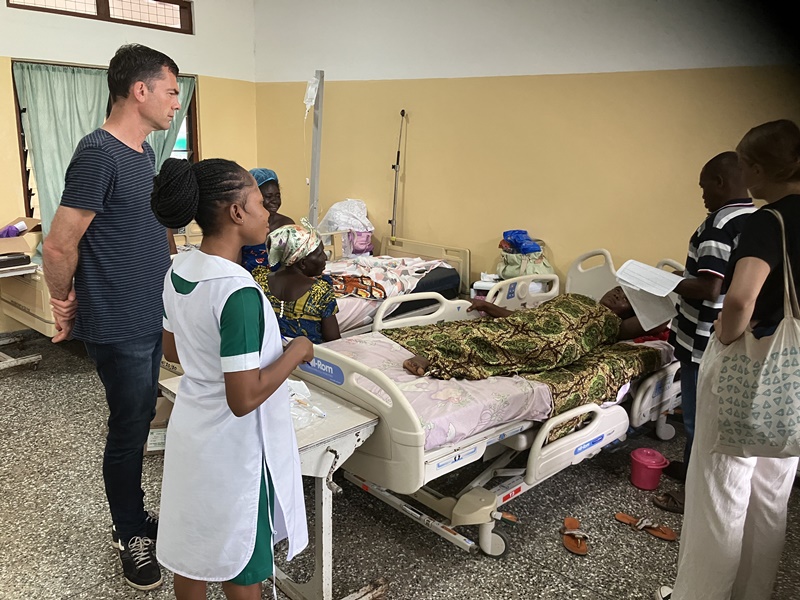 |
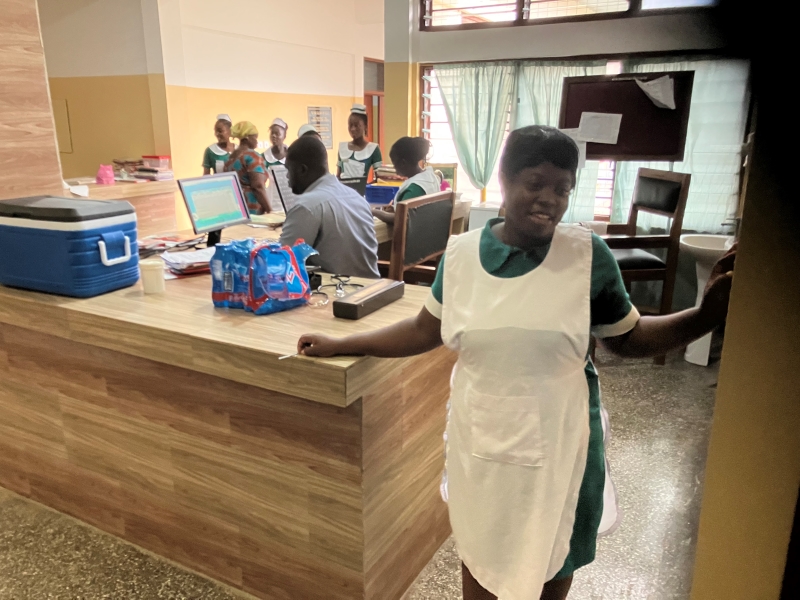 |
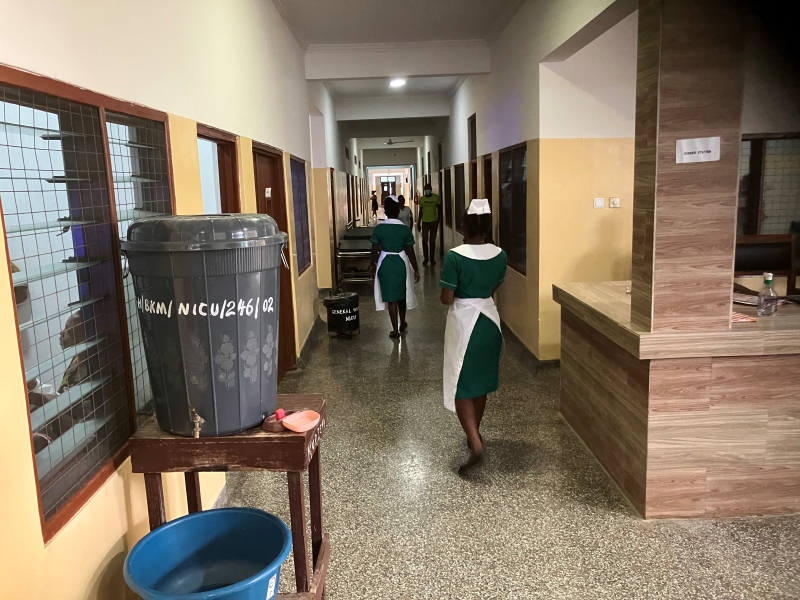 |
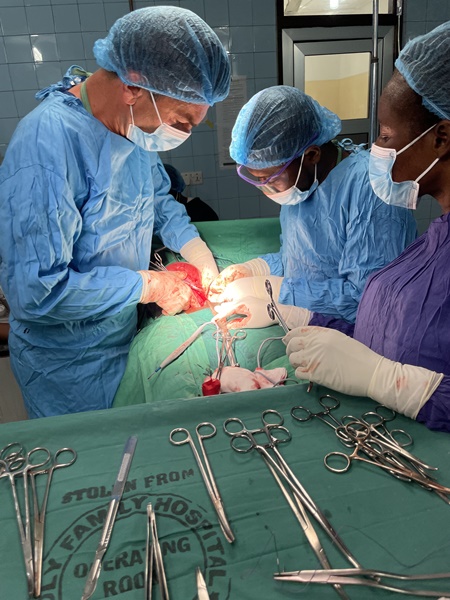 |
|
The same program was run in three workshops in total, so that about 45 midwives and doctors could be reached very efficiently. The anesthesiologist (Hans Visscher) gave extensive daily lessons to the anesthesia staff and also walked around the OR to give ad hoc advice.

14th Report Working Visit to Berekum
Woforo dua pa a na yepia wed.“It's when you climb a good tree that we give you a push.” It is a symbol of support for good causes.
The 14th working visit to Berekum, by Harm de Haan and Jules Schagen van Leeuwen, took place in Nov-Dec 2021.
Due to the Covid-19 pandemic, some time had passed since the 13th visit (Feb 2020), and despite the fact that the pandemic is not yet over and many hospitals in the Netherlands are experiencing logistical problems, the situation in Ghana does not seem to be too bad at the moment. This is despite the fact that less than 8% of the population in Ghana has been vaccinated. The contrast between the way Ghana tries to keep the virus out of the country, by requiring a negative PCR before departure, repeating it upon arrival in Accra and requiring and checking a valid vaccination certificate with a minimum of two vaccinations, and the Dutch approach, in which there is no requirement or check after return to Schiphol Airport, is striking.
In addition, Ghana kept its borders with neighboring countries closed for a long time. Upon return, a PCR test had to be taken in Kumasi in time to get to Accra Airport in the first place. Our question as to whether people had ever seen a positive result at this last, certified test site, was answered in the negative. That may say something about the reliability of the test, but in any case, the willingness and discipline of Ghanaians to adhere to the basic requirements, keep their distance, wash their hands etc, and wear a mouth mask, is striking. Also, the contrast between the acceptance with which Ghanaians accept the restrictive measures and the discontent with which this happens in the Netherlands is great. But it is illusory that one can prevent transmission with these rules in the small living quarters where people bivouac in Ghana, and that also applies to the overcrowded transport vans.
The impact that infectious diseases can have has disappeared from our collective consciousness in the West. In Africa, this is certainly not yet the case. In addition, scientific research in tropical Africa shows that the constant exposure to parasites (e.g. intestinal parasites and malaria) puts the immune system of many people on edge, enabling them to respond adequately to the virus (1). In addition, the population structure has a relatively very young population. In this part of Africa it is therefore the more affluent and older people with low exposure to parasites, who are overweight and hypertensive, who are at risk of a serious Covid infection. Whether this picture will change as the virus mutates is not yet clear. The hospital staff has been largely vaccinated with 2 Astra Zeneca vaccines though. The isolation ward, where patients with drug-resistant tuberculosis used to be cared for, often in combination with an HIV infection, has been renamed the Covid ward. This was at the instigation of the United Kingdom, which donated 4 breathing machines to the hospital, exclusively for the treatment of patients with Covid.
At the time of our visit, no Covid patients had been admitted for six months. The respirators have never been used. Nor is there any staff capable of operating these devices 24 hours a day. The daily commercials on the radio in which the NHS, through recruitment agencies, tries to encourage doctors and nurses to come and work in England in order to solve their staff shortage are also shocking. This is a blatant violation of the code of conduct drawn up by WHO to prevent this, to which the UK is also a signatory.
Where have the multidrug resistant TB patients gone now ? No one knows. What is clear is that in low and middle income countries many more people now died and are dying from treatable diseases than from Covid (2). And that the Covid measures are only making this worse. The lockdown and curfew that they instituted in Ghana at the beginning of the epidemic meant that many people could no longer come to the hospital, nor dare they come, for fear of contracting the virus there. The closure of schools and universities etc for almost a year caused great damage. The Covid epidemic has shrunk the country's economy by about 10%, with the poorest people hit relatively harder.
By now the mood has changed somewhat: 'it is not our disease' says the average Ghanaian, and the hospital is as busy as ever.
In the first wave there were four deaths in Berekum; a second wave has not occurred yet: no large numbers of patients with respiratory distress, no sudden deaths from respiratory problems. Despite the underreporting that is bound to occur, large parts of tropical Africa seem to have been spared.
Meanwhile, the rebuilding/renovation of the delivery room complex (which is what we had come for in the end), and the extension attached to it, is almost complete. In addition to the previously delivered new part (phase 1), and the renovated maternity ward (phase 2A), the delivery room part (phase 2B) is now also ready. There is still some painting to be done, but the moment was there to have an official plaque unveiled by the bishop.
Upon completion, the entire building now has a usable area of over 3000 m2. There are now 8 delivery rooms, a neonatal intensive care unit. Wards and rooms for pregnant women with problems such as high blood pressure and pre-eclampsia, wards and rooms for women who have given birth, teaching rooms, rooms and rooms for checks on pregnant women, ultrasound room, rooms and rooms for the staff, an OR room for emergency operations and 2 courtyard gardens.
Never could we have imagined that what we thought were such ambitious plans could be realized. Seven years ago we promised Florence Agadzi, then head of the midwifery training program, that we would do our best to improve the conditions in which women in Berekum had to give birth and in which her students had to be trained. And now, with the help of many donors, including the contribution people made locally, a beautiful building stands. A building that provides more and better opportunities for training; for it is ultimately the qualities of the people on the floor that determine the quality of care!
After painting, the patients will be redistributed throughout the building, and the "conference room" will also be used for training and transfers. The logistic processes will have to be adjusted a bit, but then it might also be possible to have the antenatal clinic in this building. With the contractor and the management it was decided that the number of toilets and showers placed outside the building is too low and that a drawing will be made to adjust this. Then there will be a future-proof building where, besides clinical care, many training sessions can be given.
After these developments, the University of Kumasi now sends many more final year students (house-officers) to Berekum. But also the own large obstetric training in Berekum, benefits from the expanded learning-working opportunities which above all enables local women to become mothers in a respectful and safe way.
With the new house-officers, the new medical officers and the two present tropical doctors in training, a lot of surgery was done, with Edward Mintah as always taking excellent care of the organization but also of the anesthesia. Phantom lessons were given to the midwives and the house officers. Conversations were held with the medical staff, about care, training and the future. With the head of the delivery rooms, Joyce Tachie, plans were made for even more cooperation between the Netherlands and Berekum. We have great confidence in this enthusiastic, modest and very knowledgeable midwife. The role of midwives in monitoring the physiological partus needs to be strengthened. Despite our previous efforts, the cesarean section rate is not decreasing (now over 30%). Young doctors do learn how to do this procedure in the beginning of their training, but much less when there is a real reason for the sectio caesarea. They also have much less mastery of doing vacuum extractions and breech deliveries. This will have to be a challenge for the future. The same applies to getting uterine cancer screening functioning again. Midwives can also play a role here.
Unfortunately, the container that we had stuffed with medical equipment together with some partner hospitals has not yet arrived in Ghana. The boat had been delayed in Senegal. We could have used the many surgical instruments in particular. The clamps with which we now had to operate were sometimes a challenge.
In two rest days we visited the monastery in Kristo Boase, and then the "hand-in-hand project" in Nkoranza; a place where mentally and doubly handicapped children who were left behind/found somewhere in Ghana are given a safe place and are cared for. Small houses furnished as guesthouses make it possible to support this fantastic project.
See also www.operationhandinhand.nl The rest days were welcome. The stay in the guesthouse, also a project of our foundation, was very pleasant indeed, and we let ourselves be spoiled by our cook Peter. Only at night, in the run-up to Christmas, there is an increasing need for small evangelical religious denominations to use a 'public address' system to demonstrate their adherence to God through an uninterrupted stream of noise and hell and damnation sermons. Advice: take good earplugs with you!
The way back was via the "Peace and Love Hospital" in Kumasi, also for the taking of the necessary Covid-PCR. Dr. Beatrice Wiafre, also like Lawrencia Dsane, was warmly thanked for the support and cooperation given.
1. D. Wolday et al. Effect of co-infection with intestinal parasites on COVID-19 severity: A prospective observational cohort study. EClinicalMedicine 39 (2021) 1010
2. D. Bell et al. Relative Burdens of the COVID-19, Malaria, Tuberculosis, and HIV/AIDS Epidemics in Sub-Saharan Africa Am. J. Trop. Med. Hyg., 105(6), 2021, 1510–1515
13th Report Working Visit to Berekum
This visit took place between mid-January and mid-February, by Dr. J. Schagen van Leeuwen. For the report, please refer to the Annual Report 2020: click here
12th Report Working Visit to Berekum, Sampa and Hwidiem
From 6 to 20 October 2019, a team consisting of Lawrencie Dsone (AIOS gynaecology), Sacha Evenhuis (gynaecologist in Assen), Heleen Winter (midwife from the UMCG) and Harm de Haan (gynaecologist in Zwolle) again visited Berekum. Skills and drills were given to the house officers and midwives, who were all exempted for this in the morning. In the afternoon, education was given to the third-year student midwives at the school for midwives. There were also daily surgeries with the house-officers and tropical doctors (in training). For the first time we stayed in the guesthouse, which was very satisfactory. The space, atmosphere, location and possibilities of this guesthouse are appreciated by many. We visited Dr. Isaac Doudu in Sampa (where residents stay in the Fountain Care Clinic) and the ST. Elisabeth Hospital in Hwidiem, almost two hours drive south of Berekum. Also in this hospital there are good opportunities for internships for residents: we received a warm welcome and made good plans with them. In the weekend between both working weeks we visited Cape Coast where we participated in the annual "awareness-walk" for breast cancer which was organized by the "Peace and Love Hospital" in Kumasi. An impressive event where an estimated 50.000 people participated and where a lot of radio, TV and internet publicity was generated. Meetings were held with the management, the Bishop of Sunyani, the contractor and Form Ghana. The renovation of the Maternity ward is in full swing. Temporarily the patients have been transferred to the new building, attached to the old maternity. This has set in motion a logistical process through which they seem to be skilfully making their way. The renovation is going well and on schedule and the end result seems to be very nice, especially when this building will be connected to the new one and the available space will be a bit bigger again. Without the tremendous help of Mr. Edward Mintah these weeks would not have been possible: all coordination, appointments and organizational matters he picked up quickly and we therefore owe him (again!) many thanks.
11th Report on Working Visit Berekum 26 February - 4 March 2019
At the end of February 2019, the 11e mission to Holy Family Hospital took place. This time the team consisted of Dr. Arnold Kruse and Dr. Vincent Jongen (gynecologists Zwolle) and gynecologist-in-training Lawrencia Dsane. Highlight of this trip was the opening of the new guesthouse. In this guesthouse, which for a small part is also sponsored by Berekum Foundation, the residents of the Universities of Nijmegen and Groningen / Zwolle can stay (their current residence is about to collapse). In addition, there is room for visiting medical specialists and for the Dutch tropical doctors in training who always spend half a year abroad. The opening by the bishop was festive and of course the opportunity was taken to discuss a number of current issues with the bishop and the hospital administrator Sr Reena. The renovation of the old maternity ward (phase 2) was discussed now that the construction of the new maternity ward (phase 1) has been completed. Another important event was the implementation of population screening for cervical cancer. Women in Berekum were called via e.g. churches to come forward. Specially trained nurses assessed the cervix and any abnormalities found were immediately removed by Dr. Okine, the gynecologist at Holy Family Hospital. Our role was to support the start and set up of this, supervise the cervical clinic and train the gynecologist in the treatment of the cervix. It is now intended that this important prevention will continue after our departure and plans have been made for this. As always, we were involved in many operations, with the main objective being to train the operating skills of the local doctors. Some ten major surgeries were performed by us. At the midwifery school we provided practical education (skills and drills, suturing course) and thus some 80 students were retrained. On the last day we visited the Peace and Love Hospital in Kumasi, where Dr. Beatrice Wiafe treats patients with breast cancer from all over Ghana! Here we also operated on an emergency gynaecological patient. All in all, a somewhat short but very efficient and above all useful visit!
10th Report on Working Visit to Berekum, December 2 to 14, 2018.
The team for this visit consisted of Dr Jules Schagen van Leeuwen (gynecologist in Niewegein), Annet van Veen (gynecologist in Harderwijk), Dr Harm de Haan (gynecologist in Zwolle) and Mr Henk de Haan (treasurer Berekum Foundation).
The visit was planned around the celebration and opening of the new delivery rooms (on December 6), as well as the 70th anniversary of the hospital. To our pleasant surprise, the president of Ghana indicated that he wanted to officially open the new buildings himself. This meant that the official opening had to be postponed till 18th December, and the team from the Netherlands could unfortunately not be present.
An unofficial opening took place nevertheless, and was attended by the bishop, the architect, the contractor, the hospital management and staff. Following this event, a meeting was held to discuss construction and financial matters.
The hospital has ordered 65 beds for the delivery rooms. It is expected that these will arrive early 2019, after which the move from the old to the new building can be organised. The new building can accommodate only a part of the patients from the old maternity wards. Because of the logistics related to housing the patients, the renovation of the old maternity wards will be done in two phases.
We also visited Form Ghana, near Berekum, one of our annual sponsors.
Meetings were held with the house officers and the assistant doctor in tropical medicine. The housing situation of the house officers is currently not ideal and the assistant doctor also had to vacate her temporary lodging to make place for a midwife. We have therefore started with the construction of a guesthouse, which will provide space for assistant doctors in tropical medicine, house officers, visiting specialists of the Berekum Foundation (or from other organisations). The walls of the guest house have already been built and it is expected that the building will be ready early 2019. During the visit, we discussed some adjustments with the contractor.
No additional training for the midwifes were planned during this visit, because the midwifes were busy studying for their exams that were scheduled to take place just before Christmas. This gave the three gynecologists more time to support their Ghanaian colleagues with some surgeries and to provide in-service training to one the younger Ghanaian medical doctors.
In recent months, there was some unrest between various population groups in Drobo. Therefore, for the time being, no house officers are placed in the Drobo hospital. We nevertheless visited the hospital and Annet van Veen supported Ghanaian staff with surgical interventions, which was very much appreciated. We also visited Isaac Duodo, paediatrician in Sampa. He provides great and enthusiastic support to the Dutch house officers. We also visited the clinic which is being constructed.
A very special visit was organised by Edward Mintah. He brought us to the palace of the chief of Berekum. We were warmly received and welcomed by the Queen-Mother of Berekum.
On our day of departure we met Mr Ron Strikker, Ambassador of the Netherlands in Ghana. We informed him about the activities, the presence of Dutch students and medical doctors, and our future plans. He planned to attend the official opening of the new maternity wards, as well as the celebration of 70 years Holy Family Hospital in Berekum.
Travel report from Sterre and Shari
The past three months we did our clerkship in the Holy Family Hospital in Berekum. We have experienced a learning full but most of all fantastic time. We learned about tropical diseases such as malaria, tuberculosis, RVI and snakebites. We have never seen these clinical cases before in the Netherlands.Besides the clinical work in the hospital we went on outreaches with FOHA and assisted at the UNCHR Fententaa refugee camp.
Furthermore we did a little public health research about Family Planning. We distributed questionnaires among women in the hospital to get an general idea about their opinion and usage of Family Planning methods. We found out that many women doni't use contraceptive methods because of the side effects. Especially infertility came out as a side effect that restrained women from using contraceptives. We hope our little research on Family Planning will be continued.
Besides medicine we learned many things about the Ghanaian culture. The people are so friendly and welcoming, that we really felt at home in the Berekum community. For example we learned how to dance like a Ghanaian and we tried almost every dish from the Ghanaian cuisine. However contrary to the Ghanaians, fufu will never become our favourite dish, unfortunately. To conclude, we had an amazing time in Berekum and would love to come back one day when we are graduated.
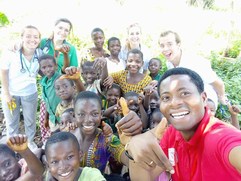 |
Report 8th visit to Berekum, February 10 to 23, 2018
On Saturday February 10, 2018, we left for Ghana with a team of six people from the Isala hospital. Two orthopedic surgeons, Dr Jan van Haastrecht and Dr Nico Groot, joined for the first time. Lawrencia Dsane Bawuah, assistant doctor gynecology, and gynecologists Dr Hans Beekhuis and Dr Harm de Haan were part of the team too. In addition, Jopke Janmaat, house officer, joined and will stay for a 10 week period in Ghana.The orthopedic surgeons have worked for many years in Cameroon. Unfortunately, that project location is no longer safe to reach and they thus wanted to explore whether the activities thus far carried out in Cameroon, could be moved to Berekum. Prior to the visit, discussions were held with Dr Romeo Hussey, surgeon in Berekum, who would become responsible for this collaboration. Dr Hans Beekhuis joined to provide training to midwifes (from the Berekum region) in conducting echo's. Five midwifes were asked by the hospital and the school for midwifery to come to Berekum for this training.
After spending the night in Accra, we flew to Kumasi where transport from the hospital was awaiting us to bring us to Berekum. We were provided with rooms on three locations around the hospital grounds, and had a kitchen to ourselves in a central location in between our rooms. Peter, the cook, was again present to take care of our culinary needs.
The next day we were shown around the hospital grounds, met all medical doctors, as well as the new internist, Dr Hagan, who was also acting head because Dr Attu was on leave. We also met with management and discussed the work schedule which was shared with management prior to our arrival.
The orthopedic surgeons were accompanied by Dr Hussey, while the gynecologists were supported by Dr Okine (the Ghanaian gynecologist). During the first week, the surgeons noted the big need for training in dealing with acute trauma. They also noted a lot of areas in the hospital that could be improved: better screening prior to surgery; improving surgery techniques and processes; or improving rehabilitation and support of recovery following surgery. Many discussions took place with Dr Hussey, and plans were made regarding how the collaboration could be continued in the near future. This would mean an expansion of the collaboration between Isala Zwolle and the Holy Family Hospital in Berekum. Preoperative roentgen pictures could be taken, the plaster facilities could be improved, and the physiotherapy unit could be strengthened so that rehabilitation opportunities would become more successful.
In the first week we also visited the St Mary Hospital in Drobo. During the day, we supported various surgeries carried out by Medical Doctors and a tropical doctor (who had screened patients ahead of the day). The following day we participated in festive opening (and blessing) of the new eye clinic in Drobo. While Hans Beekhuis provided echo training to midwifes in Drobo.
We also visited the Fountain Care Clinic in Sampa, located in a poor and isolated part of Ghana near the Ivory Coast border. Pediatrician Isaac Duodu has the responsibility for this Clinic, where House Officers from Zwolle are also working. We visited the very nice accommodation, discussed further cooperation, the sharing of pediatric protocols and more frequent visits.
Dr Lam Trang is a tropical doctor in training from the Royal Tropical Institute Amsterdam and is also supported by our team in Berekum. She has followed a year of surgery, as well as a year of obstetrics training in the Netherlands. She will complete her training with 6 months of tropical medicine in Berekum. Drs Hagan, Okine and Hussey will supervise and appraise her work. Edward Mintah has organized her accommodation on the hospital grounds.
On Saturday, 17th February, the two orthopedic surgeons left for the Netherlands. The team that stayed behind, jointly with two House Officers, made a trip to Mole National Park. We traveled through Techiman, Kristo Boase and Kintampo and also visited the 500 year old mosque in Larabanga.
The second week of our visit was oriented towards training. Dr Beekhuis provided a daily echo training for midwifes. In the afternoon, Dr Dsane, Beekhuis and de Haan provided training to third year midwifery students. Obstetric emergency situations were practiced during so called 'skills and drills' sessions.
The new construction of the maternity hospital is becoming beautiful. The builders are using good and solid materials, the lay-out of the new building is good with sufficient opportunities to connect the new to the old building. Unfortunately, the construction has come to a hold, because of insufficient financial resources. During discussions with the constructor and the bishop, it turned out that the disappointing exchange rate of the Cedi, and the fact that the constructor had prefinanced building materials and was now waiting for further payments, caused the temporary hold of the construction. Following additional discussions with the bishop, it has been agreed that the Berekum hospital will contribute its share to the construction costs. After this, Foundation Berekum will have to raise additional funds and contribute these to the constructions. The hospital in Berekum will exist 70 year at the end of 2018. The management would love to be able to open the new maternity ward at that occasion. This is quite a challenge.
We held discussions with the management of Form International and Form Ghana - a large reforestation company nearby Berekum. The aim was to improve collaboration, provide training to the nurse working with Form, while at the same time ensuring the financial support from Form to the Berekum hospital (through Foundation Berekum) is valued.
On Friday, February 23rd, we left for Kumasi, flew to Accra and returned to Amsterdam that same evening.
In conclusion, we were very pleased with this work visit. We received a very warm welcome. The hospital staff had taken care of our transport, food, accommodation, and had organized the training. We held many meetings, regarding the construction of the maternity ward; the collaboration with the orthopedic surgeons (in Berekum and in Sampa); and the collaboration with the Royal Tropical Institute in Amsterdam. The accommodation available for guests in Berekum is not ideal. This accommodation may need to be improved, especially if we are considering expanding the collaboration with additional tropical doctors in training, and additional activities between Isala and Berekum. Better accommodation would also allow others from Isala to join: technical people for maintenance of equipment; paramedics to support rehabilitation programs; other experts who can provide training to Ghanaian medical specialists. Because teaching and training is and remains our main objective it is important to give some attention to this aspect.
Report 7th visit to Berekum, November 2017.
By: Gunilla Kleiverda, gynecologist in Almere, Deodata Tijssseling AIOS cluster Utrecht and Jules Schagen van Leeuwen, gynecologist in Nieuwegein/Utrecht.This was the 7th time a team visited the Holy Family Hospital in Berekum. The team included three people: One gynecologist in training, and two experienced gynecologists.
Throughout our stay, we gave several trainings. A training was
provided at the Nurse and Midwifery Training College, as well as to the
school in Drobo which is linked to this college. Over 100 midwifery
students received training. We provided some theory, but our focus was
on skill development through role plays of emergency situation during
deliveries. We addressed breech delivery, umbilical cord prolapse,
serious preeclampsia during pregnancy, massive blood loss during
delivery, and failure of progress during delivery. We also trained the
students in attitudes, behaviors, family planning and safe abortions.
School management evaluated positively the format of a full-time
training, involving all final year students. Because we have now been
providing this course around three times per year, students are more at
ease and manage to master the course content better in the available
time.
We also provided bedside teaching: visiting patients jointly with the local staff, as well as teaching surgery skills to Ghanaian doctors. Various surgeries were conducted by the team, including large abdominal surgeries. During earlier visits the younger staff members were trained in performing Caesarian sections. During this visit, we stressed to only use a Caesarian when needed, to avoid overuse. The local gynecologist, Emmanuel Nii Okai Okine (who is since a year the only gynecologist in the district), plays an important role in ensuring guidelines for this intervention are followed. Because of our presence, Emmanuel could also spend more time on the quality of care, for example the maternal and perinatal audits. In the meantime, the hospital also has started using electronic patient records, and employed a person to help enter all information, and to avoid doctors spend their time on this administrative work. The Hospital matron stated: "doctor, I don't want you to waste your time on a computer". There are many things we can learn from Ghana!
In addition to all of the above, we provided ultrasound training to the midwifes. Local doctors received a refresher course in this area too.
In between all activities, we held frequent meetings with the
hospital management. The funds transferred by Foundation Berekum have
been used to lay the foundation of the new maternity ward. Funds have
been well spent. The aim is to build a maternity ward with 100 beds.
The current ward has 35 beds only, which is totally insufficient. We
inspected the construction side with our Ghanaian colleagues. After
completion of the new ward, the intention is to renovate the old ward.
Although progress was made with the construction, we realized that
the limited financial resources have slowed down construction. The aim
is to complete the roof by the end of the year, making sure that the
start of the rainy season in April will not damage the building. The
last rainy season, and a big storm, caused some serious damage to some
vital hospital buildings. The repair after the storm used up many of
the available hospital resources.
Each one of us had brought around 46 kilos of useful medical
material for the hospital from the Netherlands. This mainly concerned
materials requested by the hospital, such as equipment for the
operating theater to measure heart frequency, blood pressure and oxygen
saturation.
During the weekend, we visited the Bia National Park. Jointly with
our local project manager, Mr. Edward Mintah, and the driver, we went
for a long hike in the Park. We did not see forest elephants, but it
was impressive to observe how people manage to survive in and around
the jungle.
At the end of the visit we had a nice dinner with the hospital
management team. The final evening of the visit was spent at the KoSa
beach resort near Elmina.
In short, we spent again two very successful weeks in Ghana. Our
biggest concern for the near future is the lack of financial resources
to complete the construction of the new maternity wards.
Report 6th visit to Berekum, March 25 to April 6 , 2017
By: Maarten Glas, gynecologist Wilhelmina Hospital Assen; Vincent Jongen, gynecologist Isala Zwolle; Miriam Schubert and Emily Diekman, midwifes Isala Zwolle.The team that joined the 6th visit to Holy Family Hospital in Berekum consisted of four people: two midwifes from the Isala hospital in Zwolle and two gynecologists. This time the visit focused on midwifery training at the Nurses & Midwifery Training College, which is affiliated with the Berekum hospital. The training course, provided by the two midwifes and one gynecologist, was run three times: twice in Berekum and once in Drobo. Each group consisted of 35 students, and we thus reached over 100 students with this training! A small part of the training was theory oriented. The main part, however, was oriented towards training of practical skills for midwifery calamities using role-play. Topics addressed included: breech birth, cord prolapse, preclampsia, severe bloodloss, and prolonged labor. A lot of attention was also given to issues of attitude and moral. During the course evaluation, conducted jointly with the school management, positive feedback was received on the format used - a full time training reaching final year midwifery students. i It might be possible to provide the same course annually.
The fourth team member (a gynecologist) focused mainly on bedside teaching - judging patients jointly with local medical staff and teaching surgery skills to Ghanaian physicians. Surgeries were conducted jointly with Ghanaian physicians to expand their surgical skills. Sixteen large abdominal surgeries were carried out. Following the training, the local physicians were able to perform certain interventions themselves, thus reaching am important learning goal.
In addition, around 16 midwifes and a local gynecologist, all working in the Berekum hospital, received training in using ultrasound. One of our gynecologists also spend a day in the neighboring hospital of Drobo to provide further education in midwifery to a Dutch physician specialized in tropical medicine.
In between all these activities, frequent meetings were held with the hospital management. The construction of the new maternity ward, partly financed by the Stichting Berekum, was discussed as well. The hospital administrator, the contractor, the medical director, the architect, the bishop, and one of the Dutch gynecologists attended this meeting. The funds transferred by our association have been used to construct the fundaments of the new maternity ward, and we could establish that funds have been used well. We jointly inspected the building site. The new construction is progressing well, and construction work is being documented on video. The aim is to build a ward that can accommodate 100 beds. The current maternity ward of 35 beds is totally insufficient for the future of the Berekum hospital. The plan is to renovate the old midwifery ward after the new ward has been finalized. It became clear to us, however, that we still have a big job to do to secure the necessary funds to finalize all the construction work. The construction work will continue in the phases described above. Progress will be monitored during our half-yearly visits to Berekum.
As during the previous visits, we also brought with us equipment and materials for the hospital which it had specifically requested: for example a machine to measure heart-frequency, blood-pressure and oxygen saturation that will be used in the operating theatre; clothes to be worn in the operating theatre (which will replace the old and often torn clothes); as well drugs to be used during loss of blood (which were not available). People were very pleased with all these materials.
During the weekend the team visited the Mole Game Reserve in the north. In addition to the team, our local project manager (Mr Edward Mintah), the driver, and the four Dutch house officers, also joined us in the bus of the Midwifery School. We made up a merry group of ten people who enjoyed the swimming pool of the lodge and the elephants of the game reserve.
We ended the, highly valued, visit with a joint dinner with the hospital management. The previous evening the team had already been invited to the home of the bishop of Sunyani, a very honorable recognition of the work conducted.
In conclusion: the mission was very successful and flawless. This time we focused on midwifery skill training for midwifery students. Besides this, it was important for Stichting Berekum to inspect the construction process of the maternity ward and to discuss the next steps with the bishop.
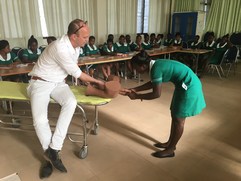 |
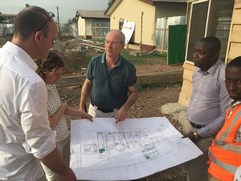 |
|
| ..... | ..... | |
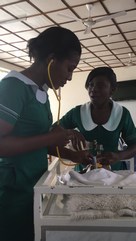 |
 |
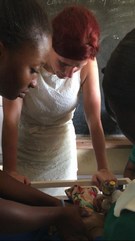 |
| ..... | ..... | ..... |
Fifth working visit: 14 to 27 November 2016.
Team members: Aren van Loon, gynecologist Martini Ziekenhuis Groningen; Hans van Unen, paediatrician Isala Zwolle; Lawrencia Dsane Bawuah, assistant doctor gynecology UMC Groningen; and Harm de Haan, gynecologist Isala Zwolle. Aren has been tropical doctor in Zambia, Hans has followed his education as paediatrician in South Africa.
After a quiet flight to Accra, we continued our travel to Kumasi by air the next day. In Kumasi a driver and car from the Holy Family Hospital met us. The drive to Berekum took another three to four hours. In Berekum we were again welcomed warmly and enthusiastically, as was the case during our previous visits. The Holy Family Hospital had organised housing for all four of us on the campus of the Nurses and Midwifery Training College, located directly next to the school, which was ideal for our training work. Peter, through the Holy Family Hospital, catered for breakfast, while lunch and diner were organised by the school.
Each day started at 7.30 am with a handover meeting. All doctors, medical students and physician assistants participated in this meeting, which now takes longer than before because much more time is devoted to presentations and to the problems encountered during the night shift. Participants also ask many more questions, which results in staff coming well prepared to the meeting. In particular, the inputs from Frank Gyamfi and Hussey (both surgeons), and Okine (gynecologist) have contributed to this development.
Following the handover meeting, Lawrencia Dsane and Harm de Haan visited the wards and provided bedside teaching. After each ward round, the assistants and house officers followed the OK-programma. At the same time, Aren van Loon and Hans van Unen taught nursing students as well as 3rd year midwifery students. Aren also provided echo-lessons in the morning to medical doctors and midwifes. This was very much valued. Groups of students were split into small groups in order to receive hands-on training (in delivery, stitching, reanimating a new born).
Our first weekend was spent in the Mole National Park, where we enjoyed a bush walk and a safari drive. On the way back to Berekum, we took the (very bad) road via Wenchi to Sampa, a remote part of North-West Ghana. Hans van Unen stayed three days in the Fountain Care Clinic in Sampa, where doctor Isaac Duodu runs a children clinic and had organised an outreach programme for these days.
The other team members continued their travel to Berekum, where a large conference was planned for Monday, 21 November. Led by the bishop of Sunyani, the drawings for the renewal and rehabilitation of the out-dated delivery rooms and maternity ward were discussed. The medical staff; head of nurses; head of the midwifery school; hospital management; building contractor; bishop; Lawrencia Dsane and Harm de Haan were present. After four hours of discussing the various aspects of the new construction and renovation, the soil, on which the construction will take place, was blessed and the bishop and Harm de Haan dug a first symbolic ditch. Following some final adjustments to be made to the drawings, phase one of the building project will start in January 2017. The financial resources for the renovation are already available. During this first phase a new building, attached to the old building, will be constructed. After phase one, patients will temporarily move to this new part, so that the old building can be completely renovated (phase 2). The third and fourth phase of the renovation include a small extension to the maternity ward and the addition of a midwifery operating theatre. The atmosphere during the discussions about the renovation was very constructive and inclusive. All participants contributed and jointly assumed responsibility to complete the project within time and budget.
The remaining of the week was spent teaching at the midwifery school, the echo-room and the operating theatres. In addition, patients from Drub were sent to Berekum for surgery. Van Unen returned from Sampan for the final lessons in reanimation for midwifes in training. The week ended with a quiz for the 65 midwifery students. With great enthusiasm, the students sang for the prize-winners and the teachers received traditional shirts.
The last evening ended with a dinner jointly with the medical staff and the hospital administrator. We all could look back at a very inspiring and positive two weeks.
Early Saturday morning we took the plane from Kumasi to Accra. In Accra, we met Mr Ger Steenbergen, the first secretary of health at the Dutch Embassy in Ghana. We informed him about the collaboration achieved so far, the teaching, the house officers in place, and our objective for the collaboration: to support Ghanaian doctors and midwifes in improving the healthcare for mothers and children in a sustainable manner.
During this visit we saw a couple of new and important steps made towards such strengthened healthcare for mothers and children.
Fourth working visit: March-April 2016.
In March 2016, another visit was paid to the Holy Family Hospital in Berekum by two gynecologists from Zwolle. We have by now developed a good routine for the conduct of our ‘missions’. Our suitcases were again stuffed with useful medical supplies. This time, the Holy Family Hospital had specifically asked for some surgery utensils, which we were able to bring along. These were very well received. We also brought a second hand, but still very usable, colposcope for Dr Okine, the Ghanaian gynecologist who has recently based himself in Berekum. A colposcope can be compared to a magnifying glass on wheels, and is very useful for obtaining a better view of the cervix. We examined many outpatients jointly with our Ghanaian colleagues, and provided a colposcope training to our colleague. A lot of topics were discussed and, jointly with Dr Okine, we planned the development of a cervical cancer screening programme.We worked long days. Every day surgical interventions were conducted jointly with the Ghanaian doctors. The aim is to train the Ghanaian doctors in conducting the interventions, as well as to conduct complicated interventions jointly. We thus managed to treat many women. In addition, meetings were held with hospital management and the bishop to discuss the targets of Stichting Berekum, including the construction of a new delivery ward. The construction plan and budget needs to be developed by the local staff. Clear ideas have already been developed by the Ghanaians, and work on this will continue.
Towards the end of our stay, we spent a couple of days in the neighbouring hospital in Drobo. This is a smaller, but very well organised hospital, managed and equipped by the same diocese. During these days, and at specific request of the Drobo Hospital, we performed surgical interventions on a large number of patients, jointly with the local medical staff. Part of this staff was trained by us the year before in Berekum. From Drobo we also visited a children’s hospital in Sampa, near the Ivory Coast border. At this hospital a Ghanaian paediatrician is, all on his own, working towards improving medical facilities for children. In Drobo and Sampa, we discussed with local management the possibility of engaging medical students and house officers from Zwolle in these hospitals.
After having said goodbye to the all the hospitable people in Berekum, we visited Fort Elmina on the Ghanaian coast. This is the place where in the 17th and 18th century many Ghanaians were transported to Curaçao by the VOC (the Dutch East India Company). This is a dark period in the Dutch history and it was impressive to reflect on this during our visit of the Fort.
In November the 5th working visit to Ghana will be organised. Four
medical doctors, including a paediatrician, will join the team. The
visit will again be combined with training sessions in Drobo and Sampa.
Report of the 3rd visit to Berekum, Ghana; 14-28 November 2015
by: Dr. Harm de Haan, Dr. Jules Schagen van Leeuwen, and Dr. Lawrencia Dsane
We had high expectations in the run up to our third visit (within the period of 1,5 year) to the Holy Family Hospital. And so had the doctors, midwifes and management of the Hospital in Berekum. All expectations were more than met, especially due to the excellent planning and the real dedication of the staff in Berekum.
The local staff had, in anticipation of our visit, identified 40-45 patients for a surgical intervention. These patients arrived in small groups of 4 to 6 a day, and had all been well informed by the local medical doctors. Mobile technology has changed life in rural Africa! All patients on the waiting list could be reached efficiently. In addition to the ‘senior House officers’ from Berekum, a couple of other doctors (who had already completed their training) stayed on because they had heard they could learn a lot from our visit. Other doctors, nurses and students thus also attended every surgical intervention conducted by the ambitious Ghanaian doctors, under supervision of the Dutch team. People were willing to invest time and energy. Prior to an intervention, the surgical procedure was discussed, amongst other by using video tutorials. So doing, the intervention could take place in a safe manner. We did not experience any complications, despite the fact that the patients presented rather complicated pathology, the surgical instruments were of low quality, and the doctors were inexperienced. A big thanks goes to the anaesthesia team led by Edward Mintah!
The afternoons were devoted to teaching at the school of midwifery, as we did during our first two visits. Third year students were regrouped in small groups of 8-9 students. In three parallel classrooms, 56 students were thus trained with ‘skills and drills’. Despite the late hour of the training, students really appreciated the approach. An additional asset was that one of our team, Dr Lawrencia, is Ghanaian and speaks the local language fluently.
Our accommodation in the guesthouse was again excellent. Peter cooked delicious meals from ingredients freshly bought every day. Mr Edward Mintah was in charge of the patients’ logistics, and did an excellent job. We were also inspired by the visits to neighbourhood hospitals in Drobo and Sampa. We met local doctors who tried, with the little means available and a lot of energy, to run a health post or small hospital. This deserves a lot of respect!
This was our first visit during which “house officers” , medical students in the final part of their training, joined us. Sophieke Olijve stayed in Berekum more than a month and really enjoyed it. The ‘medical student’ also impressed the hospital management, and it was therefore decided to place 2 to 3 house officers from Zwolle in Berekum on a continuous bases. They will be able to do their practical in Social Medicine, Tropical Medicine and Gynaecology, during a period of 8-12 weeks.
On the way home, while traveling through Kumasi, we visited Bishop Gyamfi in Sunyani to discuss the construction of delivery rooms. The ones currently in use are old and dirty. They do not allow for appropriate childcare, there is no privacy and no space for family members. In addition, the current delivery rooms are not set-up for educational purposes. In short, these delivery rooms need to be renewed. The Bishop agreed and gave all his support. Of course the problem is the financial aspect. The Ghanaian government is currently facing real difficulties in paying the bills submitted by hospitals. Delays of 9 months are possible. This situation makes it very hard for hospital management to plan and reserve resources for renovation or construction work.
Shortly after our return to the Netherlands, Florence Agadzi, the head of the midwifery school, suddenly passed away at the age of 64. She took care of course coordination, was our contact person at school, and has been a good friend of Jules for 40 years. But above all, she was a good and very kind human being, who taught generations of Ghanaian midwifes the skills of the job. With her death, just before her retirement, Berekum has lost a very capable professional and a good human being.
In the meantime, the fourth visit to Berekum has been scheduled: in March and April 2016 a team will travel to Ghana. A list with names of house officers has been developed, each one them plans to spend around 8 weeks in Berekum in 2016. Finally, the annual charity dinner of Zwolle, organised by the house officers, will be dedicated to raise money for the delivery rooms in Berekum.
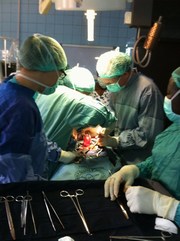 House Officer from Zwolle assisting at an operation. |
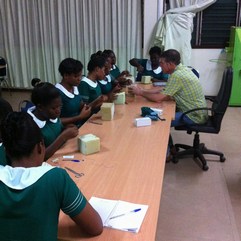 Education by Dr. J. Schagen to midwives. |
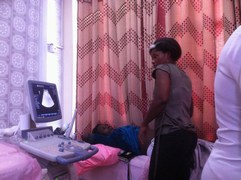 Dr. L. Dsana teaches doctors how to use echo equipment. |
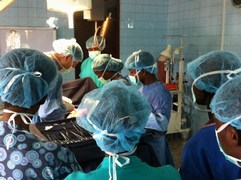 OK Ghanese doctors at Dutch supervision. |
Second working visit: March 2015.
From March 21 to April 5, two Dutch gynecologists from the Isala
hospital in Zwolle visited Berekum. During their two-week stay at the
Holy Family Hospital they managed to conduct many useful tasks.
They brought with them medical devices and drugs, including a
coagulation device for use during surgical interventions, stitching
material, surgical clothing, metal specula, and a large supply of drugs
to fight loss of blood during deliveries.
The hospital in Berekum hosts a large midwifery school.
During the visit, the Dutch doctors trained 40 3rd year students.
Training was provided in groups of ten and focused on practicing the
delivery of obstetric care in an emergency situation. The same
programme was provided to a group of midwifes from the region. The
facilitators made use of DVD's specifically targeting the African
health care situation. These so called 'skills & drills' training
programmes were very much appreciated by the students.
In addition, a course on the use of echo was provided for midwifes
from the region. In many clinics echo making devices are available.
However, the knowledge to use the device in a correct manner is
lacking. The transfer of knowledge in this area was also perceived as
very useful.
Almost daily, surgical interventions were carried out jointly with one
and the same Ghanaian doctor.
Twenty women with uterine fibroids were operated. The Ghanaian doctor
was able to conduct this intervention by himself at the end of the two
weeks.
A good number of caesareans were also carried out jointly with Ghanaian
doctors. This allowed them to further improve their surgical skills.
In between the trainings and surgical work, regular discussions took
place with a large number of people to discuss the future plans of
Foundation Berekum. A possible renovation of the delivery ward was
discussed with Sr. Wilhelmina (head of the Sunyani Diocese) and with
the medical director of the Holy Family Hospital. An option would be to
set up an operating theatre within the delivery ward itself, to ensure
that in case of emergency the needed intervention can be provided much
faster.
It is expected that a Ghanaian gynecologist will start working in
Berekum in the near future. A discussion took place with her as well to
determine what the Foundation can do to facilitate her work, i.e.
through the purchase of medical equipment.
The two visiting Dutch gynecologists were very impressed by the
dedication of the local staff. They noticed that Ghanaian doctors often
visited their patients outside their official working hours. The local
doctors, midwifes and midwifes in training, expressed over and again
their appreciation for the Dutch gynecologists. The hospital's medical
director also expressed his enthusiasm for the support provided to the
various levels of the hospital.
It is clear that there is a lot of potential in this project. This was
already illustrated by the fact that almost immediately upon arrival in
Berekum, a next visit for the end of 2015 was planned. For this next
visit the focus could be on fistula-surgery. Loss of urine, caused by a
hole in the bladder, after having given birth, is a very unpleasant
disorder. Especially for young women this may mean exclusion from
society and may result in a life lived in poverty. In the north of
Ghana, fistula of the bladder is a frequent and stigmatising disorder.

